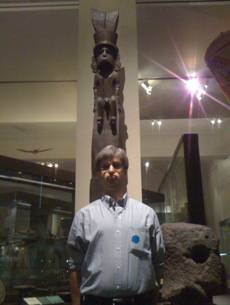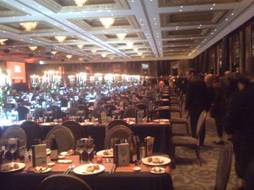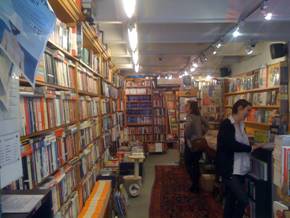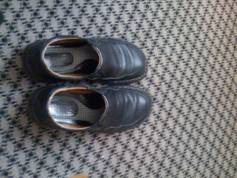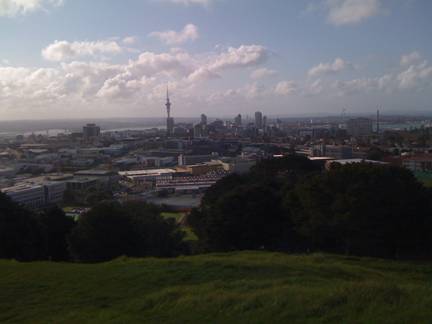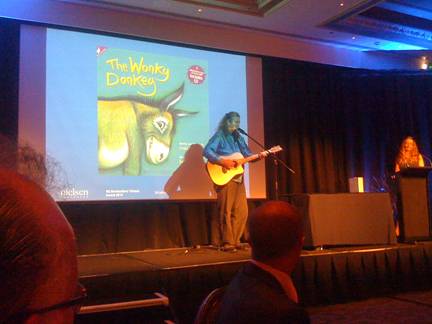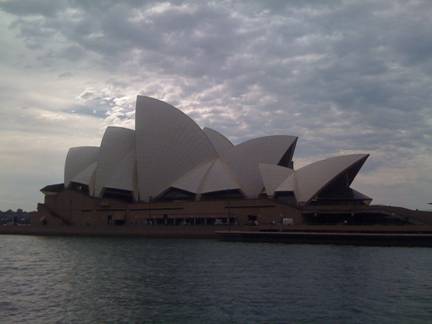A Bookselling Odyssey Down Under
By Len Vlahos, ABA Chief Operating Officer
Tena Koutou Kia Ora
[Maori greeting]
After three days in Los Angeles attending the American Society of Association Executives conference – that’s the trade association of trade associations, and, no, I’m not kidding – it was time for me to leave for New Zealand. I’d been invited by Booksellers New Zealand (the Kiwi version of the American Booksellers Association) to speak at its conference on how digitization is impacting the U.S. book market.
Booksellers New Zealand (BNZ) has the distinct honor of being able to boast that no nation on earth has more bookstores per capita. If I had any doubt about the importance of bookselling in New Zealand, they were erased when I boarded my Air New Zealand flight and found an upgraded seat. Lincoln Gould (executive director of BNZ) and Hamish Wright (president and owner of Wright’s Bookshop in Cambridge, Waipa) wanted to make sure I arrived well rested and ready to go. I’ll say just this about the travel accommodations: An upgraded ticket on a trans-Pacific flight makes 12 hours feel like two hours, and I am now, and for all time, spoiled.
After a 5:30 a.m. arrival and a pleasant ride from the airport with BNZ’s contracted driver, Patesh – a Fiji native who’s been in Auckland for 15 years – I had a quick nap at my room in the independently owned Langham Hotel, a video Skype session with my wife, Kristen, and my son, Charlie, and headed to the Lobby.
Lincoln, Hamish, and I were joined at lunch by the relatively new executive director of the Australian Booksellers Association (the other ABA), Joel Becker. We compared notes about he three markets – and, make no mistake, fellow Americans, Australia and New Zealand are distinctly different markets – and discussed plans for the upcoming BNZ conference.
After lunch, Joel and I left Lincoln and Hamish to prepare for the conference’s opening event – the New Zealand Post Book Awards – and walked to the nearby Auckland Museum.
It turns out that Joel isn’t Australian at all; he’s from Detroit. His first bookselling job, in the early ’70s, was at an Ann Arbor indie store, originally called Wahr Bookstore. Joel joined the staff after two brothers, Tom and Lou, bought the shop and relocated their new business – Borders Bookshop – to that location. Joel was only there for a year, but he has a long resume in the book business. Joel worked in the U.S. at B. Dalton, has owned an indie shop in Cairns, Australia, and has been the head of the Victorian Writer’s Center. (This isn’t a center for 19th-century British authors, but, rather, writers from the Australian state of Victoria.)
That evening, I had the honor of attending the New Zealand Post Book Awards. This is the Kiwi version of the Booker or the National Book Awards, and it is arguably the nation’s most important book industry event of the year.
If you’re thinking the book awards are sponsored by a newspaper – The New Zealand Post – you made the same mistake I did. The New Zealand Post is the national post office!
The room consisted of 20 long banquet tables, seating 25 people each, lit with candelabras and dressed with table linens and silverware as elegant as the gowns and tuxedos worn by many of the attendees. (Happily, I wasn’t the only guest who didn’t pack a tux. There were just enough black suits so that I didn’t stand out.)
The awards ceremony began as the local Maori (pronounce Mahw-ri) tribe welcomed another tribe in attendance in their native language. I didn’t understand a word, of course, but it was a beautiful, lyrical greeting, the sounds of which spoke to feelings older than human memory.
It turns out the visiting tribe was there to celebrate the nomination of Judith Binney’s Encircled Lands for the best nonfiction prize. The book is about the struggle between the Tuhoe and the New Zealand government over a stretch of wilderness known as the Urewera. From what I could glean, Binney is considered something of a hero by the Tuhoe.
Encircled Lands took not only the prize for best nonfiction, it also won the coveted Book of the Year prize. The Maori, who had come to cheer Ms. Binney, were dressed in tuxedos and evening gowns and came to the front of the room and performed a traditional Haka dance in her honor. The assembled crowd loved it, and I was transfixed. (You can see full results of the Book Awards here.)
Having been intimately involved in the planning and execution of each of ABA’s first five Winter Institutes, my hat is humbly off to Lincoln and his staff – Anna B., Anna H., and Cherie – for a truly stellar event.
And then I crashed. Hard. Turns out that New Zealand is 19 hours ahead of Los Angeles, my last port of call before leaving the U.S., and my body felt every minute of the time change.
Bleary-eyed but caffeinated, I spent Saturday morning at a session titled “So You Want to Open a Bookstore,” moderated by Doris Mousedale, owner of Arcadia Bookshop in Auckland, and John McIntyre, owner of The Children’s Bookshop in Wellington. It was interesting to hear how much Kiwi indie booksellers have in common with their U.S. cousins. But there are differences, too. I think the size of this country – four million people in a geographic area larger than Florida but smaller than California – makes everything less formal. And while many folks have smart phones and everyone is online, e-commerce and digital aren’t having the same impact in New Zealand they are in the States … yet.
After a business lunch with Lincoln in the very picturesque Viaduct Harbor to discuss how BNZ and ABA might work more closely together, it was time to explore a bit of Auckland. I had met the owner and manager of a self-described “incredibly small store” called Time Out Bookshop in the Mt. Eden neighborhood of Auckland and had promised to visit, so that was my destination.
Mt. Eden is one of Auckland’s 50 volcanoes, many of which are still active. It’s also the city’s highest peak and is purported to offer spectacular views of the skyline and surrounding terrain.
After dropping Lincoln back at the hotel, the taxi took me to Mt. Eden Road in a slow and steady rain. When you enter the Time Out Bookshop, you notice four things right away:
- The store is very small.
- The store is very, very busy.
- The selection, staff, and ambience are lovely.
- The store is very small.
Harriet Hodge, the assistant manager whom I had met the previous night at the book awards ceremony, gave me a tour of the store, including the upstairs event space, office, and kitchen, while she heated fresh fish for the store cat, Lucinda. The store, in that tiny space, has gross sales well over $1 million, which told me two things: Wendy Tighe-Umbers (the owner) and her staff know how to sell books, and Kiwis know how to buy books.
I asked Harriet to recommend some New Zealand fiction, and after she and her colleagues spent a generous 15 minutes with me on a very busy Saturday afternoon, I left with The 10 PM Question by Kate De Goldi (Longacre Press) and Mister Pip by Lloyd Jones (Penguin Group, NZ).
I also left with directions to reach the trail leading to the top of Mt. Eden. The weather, a fickle beast in Auckland, had turned sunny and warm, so a hike seemed like a good idea. Or rather, a hike would have seemed like a good idea had I been better prepared. Here’s what I was missing:
- Hiking shoes
- Water
- Common sense
- Physical fitness
Huffing, puffing, parched, muddied, and strained, I crested the lower peak. The views were worth the trouble. It was stunning. Had I proper shoes and better conditioning, I would have climbed the few extra meters to the top of the volcanic cone.
Upon returning to the hotel, I met up with Lincoln, Joel, and three Australians, including Simon Milne, the general manager of Leading Edge, a buying group of indie bookstores with members in both New Zealand and Australia. We shared a pint, and, then, Lincoln and I went off to dinner. The original plan was an early dinner at the hotel, but we found ourselves instead walking down a busy street in Auckland’s central district, where we stumbled on Satya, a South Indian restaurant. My past experience in Commonwealth nations–such as England and Scotland – is that you get better Indian food than you do in the U.S., and I was not disappointed in the Southern Hemisphere. The Chicken Dosa was killer!
It was then early to bed before my big day. My schedule for Sunday included:
- 11:20: Keynote address on the impact of digitization on the U.S. book market
- 1:20: Interview on New Zealand national radio on the same topic
- 2:20: Participate in a panel discussion on social media
- 3:50: Participate in a panel discussion on the future of bookselling
- 6:00: Attend New Zealand Book Industry Awards Banquet
The day was a whirlwind and a blur.
I began by attending a closed-door session of the indie bookstore members of Booksellers New Zealand. Since it was “closed door,” I won’t give any details other than to say Kiwi booksellers are experiencing many of the same challenges faced by their American cousins, and they’re no less passionate about them.
I then listened to John Allen, New Zealand’s chief executive and secretary of foreign affairs and trade. If I understand it correctly, he is the equivalent of a deputy secretary of state. Think of Hillary Clinton’s number two. Mr. Allen was an orator for the ages, using fiery speech and wild gesticulations to inspire the crowd toward a future in which New Zealand is a more prominent player on the world stage. After his exhausting but fulfilling speech, it was time for my keynote.
Having me follow Mr. Allen was a bit like having Tiny Tim follow Winston Churchill, but I did my best and think (hope) I held my own. My talk was on the impact of digitization on the U.S. book market, and it inspired a lot of conversation in the hallway after I finished, most of which I didn’t get to hear. (You can see the presentation here.)
I was whisked by car (hello again, Patesh) to New Zealand National Radio, where I was interviewed on the same topic for “The Arts on Sunday,” a program hosted by Lynn Freeman. Ms. Freeman was in Wellington and I was in a sound booth in Auckland, so it was a bit disconcerting, but she was a skilled interviewer and kept the conversation lively and fun. (You can hear the interview here.)
In the afternoon I participated in panels on social media and “The Bookstore of Tomorrow.” It was interesting to hear the Kiwi take on Facebook and Twitter in the former session and localism and “enoughism” in the latter. (I’m still not entirely sure what “enoughism” is, but I loved the phrase.)
Sunday evening was the Meridien Energy New Zealand Book Industry Awards. At the event, the industry honored booksellers, publishers, and sales reps of the year. It was a feel-good night with warm, heartfelt speeches, and a lot of wine.
The best moment was the presentation of New Zealand’s Booksellers Choice Book of the Year Award. This is very much like ABA’s Indie’s Choice Book Award. The winner was the lone children’s book on the short list, The Wonky Donkey, written by Craig Smith and illustrated by Katz Cowley (published in the U.S. by Scholastic). After Craig and Katz humbly accepted the award, Craig treated the crowd to a performance of the Wonky Donky song, which comes on a CD packaged with the book. (You can see a rendition from another event here.)
Craig added a few verses for the non-children’s crowd that had everyone in stitches.
As the evening wound down, my host and new friend Lincoln took me by the arm and led me to the front of the room where a small group was orbiting around Craig and his guitar at the foot of the stage.
“Here you go mate,” he said to me, “I hear you play guitar.” This was the beginning of a two-hour long sing-along that eventually found its way to the piano in the lobby. It was quasi-drunken and very off-key, but it was a magical night of making new friends in a far-off land that I won’t soon forget.
G’day!
I bid Lincoln, Hamish, and all of my new Kiwi friends “e nono ra” and left Auckland for Sydney. At the invitation of Joel Becker and the ABA – the other ABA – I was scheduled to speak at a one-day conference on digitization in Sydney, and Joel and I were flying “across the ditch” together.
The flight across the Tasman Sea was uneventful. My first few hours in Sydney were anything but. After a bit of a lie-down (apparently that means “a brief rest”), Joel and I met up with Derek Dryden and Fiona Stager, each a past president of the Aussie BA. Fiona’s store – The Avid Reader – is in Brisbane, several hours away, but Derek’s store is in Sydney. He then took us on a frenetic, hour-long tour of six bookshops, including his own.
Derek darted his Volkswagen through the indecipherable tangle of streets that make up Sydney’s various neighborhoods. Just when I figured we must be lost, we would pull up to a curb and hop out to visit another store. On our tour we visited:
- Berkelouw’s – Selling used and new books together
- Better Read Than Dead – Derek’s really lovely store with lots of shelf-talkers
- Shearer Bookshop – A vibrant and funky store with a cool café
- Glee Bookshop – Has an incredible event space
- Bray Books – A solid neighborhood bookshop
- Hill of Content – Great selection (And by the way that’s not Hill of CONtent, it’s Hill of ConTENT. Go figure.)
After the tour, which took slightly more than an hour, we abandoned Derek’s car and took a taxi to the Opera House Plaza. They Sydney Opera House is one of the most iconic structures on the planet, and there I was standing before it. Then near it. Then across from it. Then not so near it.
Derek led us on a fast-paced, mile-long guided tour of the Circular Quay – the harbor-front area around the Opera House – on our way to dinner at restaurant called The Wharf.
We were the only Monday-night patrons of this waterfront establishment, so we had a table up against the window through which we could soak up brilliant views of North Sydney and the Harbor Bridge.
The dinner conversation was lively and fun, and at one point actually turned to Paul Hogan. I’ve always joked that everything Americans know about Australia comes from Crocodile Dundee movies. Turns out we were right.
Just kidding. My hosts did actually discuss Paul Hogan, but only in the context of his current tax troubles. We spent most of the time talking about Sydney and about the book industry. A fun time was had by all, or at least by me.
Then it was off to Skype with Kristen and Charlie (Sydney is 14 hours ahead of Connecticut, so they were just waking up) and then to bed, to make sure that I was rested for my presentation at the conference.
The one-day Sydney conference was a big success. A line-up of six speakers educated and entertained the more than 150 booksellers, publishers, and authors in attendance on the specific topic of digital books. (Yes, it’s everywhere.)
The lineup included:
- Yours Truly – Reprising my New Zealand talk on the impact of digitization on the U.S. book market
- Mark Tanner from Google – Providing an update on Google Editions
- Brett Osmond from Random House – Discussing digital marketing strategies for publishers
- Malcolm Neil from Red Group – On how Kobo and e-books are impacting and will impact the Aussie market
- Victoria Nash from Pan Macmillan – Presenting the differing e-book business models
- Elizabeth Weiss from Allen and Unwin – Talking about metadata and DRM
The bottom line is that the digital wave is cresting on Australian shores 12 to 18 months behind the U.S. Booksellers there, like booksellers everywhere, are exploring their options. I was heartened to realize that our ABA members, thanks to IndieCommerce, are better positioned than many others around the globe to meet both the challenges and opportunities presented by e-books.
The day ended with a panel of all the speakers fielding questions from the audience, followed by drinks.
But, of course, like in New Zealand, the end of the day is only the beginning of the evening. A group of 10 of us went for dinner and (more) drinks and spirited conversation about the book industry, followed by the last few stragglers (yours truly included) having one last nightcap before turning in.
Finally, I did have one free day in Sydney, which was spent further exploring the harbor. It is a remarkably beautiful city.
I left Australia for the long journey home with a better understanding of our Aussie and Kiwi colleagues and the challenges they face. It turns out those challenges are no different than our own, and the world really is a much smaller place than I thought.
Postscript
Less than 24 hours after I arrived back home, tragedy struck New Zealand in the form of a 7.2 force earthquake. It was centered in Christchurch, a sizeable city on the South Island, and home to some of the nicest people I met while in New Zealand. While there was astoundingly little loss of life, there was colossal property damage. It reminded me of the U.S. and the U.S. bookselling community after Hurricane Katrina. ABA has been in touch with Lincoln and Hamish to offer help and support, but please join me in sending your most positive thoughts to our Kiwi bookselling cousins in their time of need. (You can follow the events in Christchurch on the BNZ website, and here's a BTW report on what Booksellers New Zealand is doing to reach out to members.)


